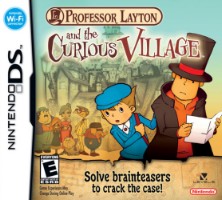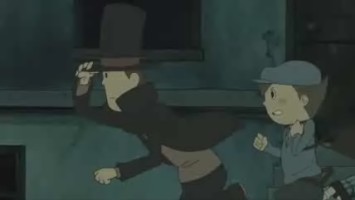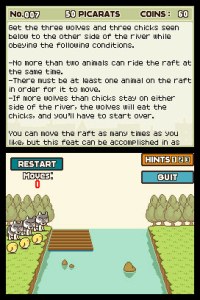[img align=right width=200]http://www.rfgeneration.com/images/games/U-072/bf/U-072-S-08110-A.jpg[/img]Dragon Quest: The Journey of the Cursed King (in the US: Dragon Quest VIII: Journey of the Cursed King) is Level-5's third RPG for the Playstation 2, and also the third game ever by the developer. After the good Dark Cloud (2000) and the great Dark Chronicle (2002), Level-5 decided to take on the massive task of making the next instalment of the long lasting Dragon Quest franchise. Not only that, Dragon Quest: The Journey of the Cursed King (from now on called Dragon Quest 8 ) would become the first game of the series for the Playstation 2, as well as being the first Dragon Quest game with 3D graphics. Not an easy task, but Level-5 fulfilled all expectations.
The game starts when the evil mage Dhoulmagus tries to steal a legendary sceptre, locked away in a local castle. To reach his goal, Dhoulmagus cursed the castle and petrified everyone inside into plant-like beings except for three individuals. The King, Throde, gets transformed into a Yoda-like toad, while his daughter, princess Medea, gets turned into a horse. The last survivor of the curse is you, the hero of this tale, and the only one not affected by the curse in any way.
Despite the shallowness and classic feel of the story, there are some interesting plot twists that'll keep you entertained until the end. Along the way you'll meet three more characters that'll join you on your adventure: Yangus, Jessica and Angelo. Yangus is rough fellow that got his life saved by the hero and calls him "guv" out of respect. Another recurring line of Yangus is "Cor' Blimey!" whenever King Throde appears out of nowhere. Jessica is a hard headed aristocratic girl that wants to avenge the death of her brother, Alister, who got killed by Dhoulmagus some time before his attack on the castle. Angelo is a Templar Knight, devoted to Abbot Francisco, but lacking the will to follow the Templars' strict moral code.
This lively bunch sets out to find Dhoulmagus, and while doing so encounter countless other characters that need assitance of some sort to advance the main plot. The game offers alot of content and a whole world to discover. Rushing through the story without doing any sidequests will almost take up 50 hours. You can almost double that number when playing at a normal pace and getting involved in most of the sidequests.
Gameplay-wise, Dragon Quest 8 is an as classic RPG as it gets. Combat is turn-based and gets triggered by random encouters. Because there are only 4 playable characters, switching characters isn't an option, meaning all characters will level up at the same speed. When faced against a number of monsters, you'll have to assign tasks to all 4 of your characters first and then watch them get executed together with enemy attacks. Besides melee and ranged attacks, characters can cast offensive or healing spells, aswell as use weapon-specific abilities. Lastly, players can opt to raise the tension of a character to build up energy that can be released in a single, devastating blow; especially useful when doing a boss fight.
Characters differ concerning the spells they can cast, aswell as the attributes they can raise. When a characters levels up, you can assign points to any of 5 attributes of that character. 4 of those attributes are to increase damage done with specific weapons, 1 attribute is different for each character. Some tactics lie in the fact that not all characters can use all types of weapons. For example, Angelo is the only one that can wield bows. The maximum amount of points that can be assigned to an attribute is 100, which can be obtained at around level 40. This gives players some time to experiment with different weapon types first before having to stick to one type to get it as strong as possible. The different weapon types are swords, boomerangs, axes, clubs, knives, scythes, whips, staves, bows and fisticuffs (no weapon equiped).
Besides weapons, characters can also equip a piece of body armor, a helmet, a shield and an accessory. These aren't as many categories as in some other RPGs, but you'll still spend a great deal of time finding, buying or making better weapons and armour. That last option is available once aquiring an Alchemy Pot. You can throw in multiple items and see what new item pops out. This mini-game is similar to the "invention" system in Dark Chronicle or the weapon system in Rogue Galaxy. It's quite important to try out as much combinations as you can, because it's the best way to get a hold of some strong weapons/armour/items before being able to purchase them. That's needed, because the game can be pretty challenging, especially early on when it doesn't take much hits to get your party wiped out. After the game's ending you can load your saved game again to just before defeating the final boss and enter a complete new dungeon after which some of the hardest boss battles can be found. Sometimes you'll have to go through large stretches of land without really knowing what to look for. Although this might set off the less experienced RPGer, old-school gamers will love the classic approach to this RPG.
If I could say only one thing about Dragon Quest 8, it would be that it's a very polished, rich and complete games. Alot of thought went into the menu, which looks particulary nice. All your items can easily be sorted with an auto-sort option in the menu, where they are displayed with beautiful icons. Also nice is that, when pressing select, you get a "battle records" menu in which you can watch a full list of of monsters, collected items and Alchemy Pot recepies.
Coupled to the great gameplay are stunning visuals and sound. Graphics are some of the best on the PS2 and the best ever in the Dragon Quest series. The cel-shading suits the game perfectly, with characters and monsters looking like they've just escaped from an anime, yet staying faithful to the Dragon Quest franchise. Akira Toriyama did the character design of this game and is the man responsible for the Dragon Ball Z series.
Sound is just as nice with convincing voice acting (despite the sometimes over-the-top voice of King Throde), great sound effects and fantastic music. The songs are all classic orchestral tracks that really set the mood for the many areas that the game is rich. From the regal intro tune to the upbeat battle song or the creepy dungeon track; they all maintain the same high level and are never out of place.
I'll wrap it up by saying that Dragon Quest 8 is one of the best games in the series aswell as one of the best RPGs on the PS2. If you're looking for a good RPG, a game that will last a long time or just a good game in general, this is a must-buy. 9.3/10
 Professor Layton and the Curious Village, developed by Level-5 (Dragon Quest 8 and 9, Rogue Galaxy, and Dark Cloud) and published by Nintendo, is a point and click adventure along the same lines as Phoenix Wright, Hotel Dusk, Touch Detective, and many others on the DS, but it's unlike any of them. The best way I can describe the game is Brain Age on crack with a storyline. The puzzles in this game are some of the most difficult I've ever encountered in any puzzle games and totally make this game worth getting, but there is a whole lot more to this game than just the puzzles. Professor Layton and the Curious Village, developed by Level-5 (Dragon Quest 8 and 9, Rogue Galaxy, and Dark Cloud) and published by Nintendo, is a point and click adventure along the same lines as Phoenix Wright, Hotel Dusk, Touch Detective, and many others on the DS, but it's unlike any of them. The best way I can describe the game is Brain Age on crack with a storyline. The puzzles in this game are some of the most difficult I've ever encountered in any puzzle games and totally make this game worth getting, but there is a whole lot more to this game than just the puzzles.
However allow me to explain the puzzles in this game for a moment, because they are pretty special. The main reason this game exists is because of Level-5 President Akihiro Hino's love of Head Gymnastics, a long-running Japanese series of puzzle books. Hino wanted to turn these puzzles into a video game, so he got in touch with Akira Tigo, the 82-year old author of the series and professor at Chiba University in Japan. Together, they teamed up to create more than 30 new puzzles specifically for the game, and Professor Tago allowed the team at Level-5 to use any of his 2,000 puzzles in the game. Now, Level-5 could have just released a puzzle compilation like Professor Ryuta Kawashima and Nintendo's popular Brain Age series, but they decided to take it a step further and add a story on top of it because, in Hino's words, "Prof. Tago is one of the originators of the genre, we didn’t want to be buried amongst many other similar games." Great decision, great decision. And one that caused Japanese gamers to buy it in droves. Now, Nintendo has made the decision to bring the first game in the trilogy over to the United States.
 The story is about a world renowned professor, Archeologist, and puzzle aficionado named Layton and his young apprentice, Luke. The pair is summoned to St. Mystere by the family of the recently deceased village billionaire, Baron Augustus Reinhold, who has left his whole estate to whomever can find the Golden Apple he has hidden somewhere in the village. In addition to the mystery of just where this Golden Apple is located, the townspeople are fond of puzzles and challenge each other with them. That is how most of the game's puzzles are found, by talking to citizens who talk to you and give you information about what they know...and puzzles. The story is about a world renowned professor, Archeologist, and puzzle aficionado named Layton and his young apprentice, Luke. The pair is summoned to St. Mystere by the family of the recently deceased village billionaire, Baron Augustus Reinhold, who has left his whole estate to whomever can find the Golden Apple he has hidden somewhere in the village. In addition to the mystery of just where this Golden Apple is located, the townspeople are fond of puzzles and challenge each other with them. That is how most of the game's puzzles are found, by talking to citizens who talk to you and give you information about what they know...and puzzles.
I know that sounds like a minigame compilation with a story, but the thing is that Professor Layton is so much more than that. Almost every aspect of this game is a puzzle, from the various mysteries you'll have to investigate, to the collecting of painting pieces, and even decorating your hotel rooms, this game is just filled to the brim with all sorts of puzzles. As I've stated, the puzzles in this game can be very difficult at times. For example, there are typical pattern matching puzzles, but then there are ones that ask you "What is necessary for human life, appears in almost every house you've visited, and decreases in amount the longer it's around? Oh, and express your answer by moving one matchstick in a series of matches that we have laid out for you." The latter type of puzzles, while very clever and challenging, tend to stump me easily and impede my progress in the game. Damn you Level-5!
 The game also is a technical masterpiece, which is surprising considering just what kind of game it is. There are many sequences of fully animated video, the cutscenes have full voice acting, and the music is just incredible, and it all sounds amazing through headphones and even on the built-in speakers. However, I really wish they would have added voice acting for all the text in the game, because it's jarring to go from an animated sequence with voice acting to a Phoenix Wright styled text adventure. The game also is a technical masterpiece, which is surprising considering just what kind of game it is. There are many sequences of fully animated video, the cutscenes have full voice acting, and the music is just incredible, and it all sounds amazing through headphones and even on the built-in speakers. However, I really wish they would have added voice acting for all the text in the game, because it's jarring to go from an animated sequence with voice acting to a Phoenix Wright styled text adventure.
Now, this game is a puzzle game, and will probably lose its appeal once you've learned how to solve everything, but Nintendo offers you a solution to that problem: free puzzle downloads every week over Nintendo Wi-Fi Connection! That's right, you'll be able to download an all-new brainteaser each week in order to keep you engaged in the game. The weekly puzzles do not offer you any bonus coins for use in the game, but will keep you amused for 20 minutes or so every week. It isn't much, but at least it will keep you thinking about the series until Nintendo brings the next game over (please?).
Overall, the game is an extremely challenging compilation of puzzles wrapped in a pretty good story with an awesome art style. However, the replayability issues may keep you from picking up the game at its current price of $30. I also have minor complaints about the small amount of video and voice acting, but I can deal with it as I'm a veteran of Hotel Dusk and Phoenix Wright. Keeping this in mind, I award the game...
9.3/10
Professor Layton officially comes out for the Nintendo DS tomorrow, but I managed to get my copy at Best Buy this past Wednesday. And guess what? I have reviewed this game before every major website on the internet!   
Score one for RF Generation!
If you aren't convinced that you should get the game, try out the demo over at the official website (www.professorlaytonds.com)
[Cover]
[Screenshot 1 is from the official trailer]
[Screenshot 2]
|
|



